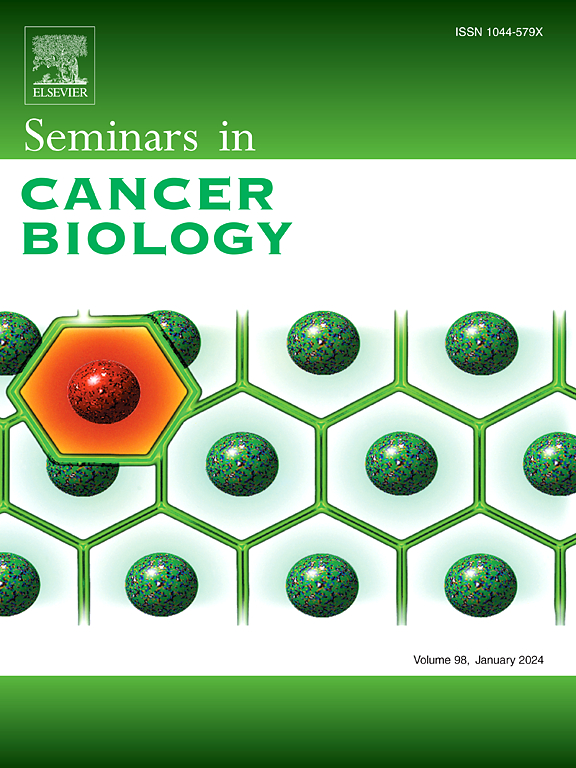Leveraging epigenetic alterations in pancreatic ductal adenocarcinoma for clinical applications
IF 12.1
1区 医学
Q1 ONCOLOGY
引用次数: 0
Abstract
Pancreatic ductal adenocarcinoma (PDAC) is a highly aggressive malignancy characterized by late detection and poor prognosis. Recent research highlights the pivotal role of epigenetic alterations in driving PDAC development and progression. These changes, in conjunction with genetic mutations, contribute to the intricate molecular landscape of the disease. Specific modifications in DNA methylation, histone marks, and non-coding RNAs are emerging as robust predictors of disease progression and patient survival, offering the potential for more precise prognostic tools compared to conventional clinical staging. Moreover, the detection of epigenetic alterations in blood and other non-invasive samples holds promise for earlier diagnosis and improved management of PDAC. This review comprehensively summarises current epigenetic research in PDAC and identifies persisting challenges. These include the complex nature of epigenetic profiles, tumour heterogeneity, limited access to early-stage samples, and the need for highly sensitive liquid biopsy technologies. Addressing these challenges requires the standardisation of methodologies, integration of multi-omics data, and leveraging advanced computational tools such as machine learning and artificial intelligence. While resource-intensive, these efforts are essential for unravelling the functional consequences of epigenetic changes and translating this knowledge into clinical applications. By overcoming these hurdles, epigenetic research has the potential to revolutionise the management of PDAC and improve patient outcomes.
利用胰腺导管腺癌的表观遗传改变进行临床应用。
胰腺导管腺癌(PDAC)是一种高度侵袭性的恶性肿瘤,其特点是发现晚,预后差。最近的研究强调了表观遗传改变在驱动PDAC发展和进展中的关键作用。这些变化,再加上基因突变,形成了这种疾病复杂的分子格局。DNA甲基化、组蛋白标记和非编码rna的特异性修饰正在成为疾病进展和患者生存的可靠预测因素,与传统的临床分期相比,提供了更精确的预后工具的潜力。此外,在血液和其他非侵入性样本中检测表观遗传改变有望早期诊断和改善PDAC的管理。本文综述了目前PDAC的表观遗传学研究,并指出了持续存在的挑战。这些因素包括表观遗传谱的复杂性、肿瘤的异质性、早期样本的有限获取以及对高灵敏度液体活检技术的需求。解决这些挑战需要方法的标准化,多组学数据的集成,以及利用先进的计算工具,如机器学习和人工智能。虽然资源密集,但这些努力对于揭示表观遗传变化的功能后果和将这些知识转化为临床应用是必不可少的。通过克服这些障碍,表观遗传学研究有可能彻底改变PDAC的管理并改善患者的预后。
本文章由计算机程序翻译,如有差异,请以英文原文为准。
求助全文
约1分钟内获得全文
求助全文
来源期刊

Seminars in cancer biology
医学-肿瘤学
CiteScore
26.80
自引率
4.10%
发文量
347
审稿时长
15.1 weeks
期刊介绍:
Seminars in Cancer Biology (YSCBI) is a specialized review journal that focuses on the field of molecular oncology. Its primary objective is to keep scientists up-to-date with the latest developments in this field.
The journal adopts a thematic approach, dedicating each issue to an important topic of interest to cancer biologists. These topics cover a range of research areas, including the underlying genetic and molecular causes of cellular transformation and cancer, as well as the molecular basis of potential therapies.
To ensure the highest quality and expertise, every issue is supervised by a guest editor or editors who are internationally recognized experts in the respective field. Each issue features approximately eight to twelve authoritative invited reviews that cover various aspects of the chosen subject area.
The ultimate goal of each issue of YSCBI is to offer a cohesive, easily comprehensible, and engaging overview of the selected topic. The journal strives to provide scientists with a coordinated and lively examination of the latest developments in the field of molecular oncology.
 求助内容:
求助内容: 应助结果提醒方式:
应助结果提醒方式:


